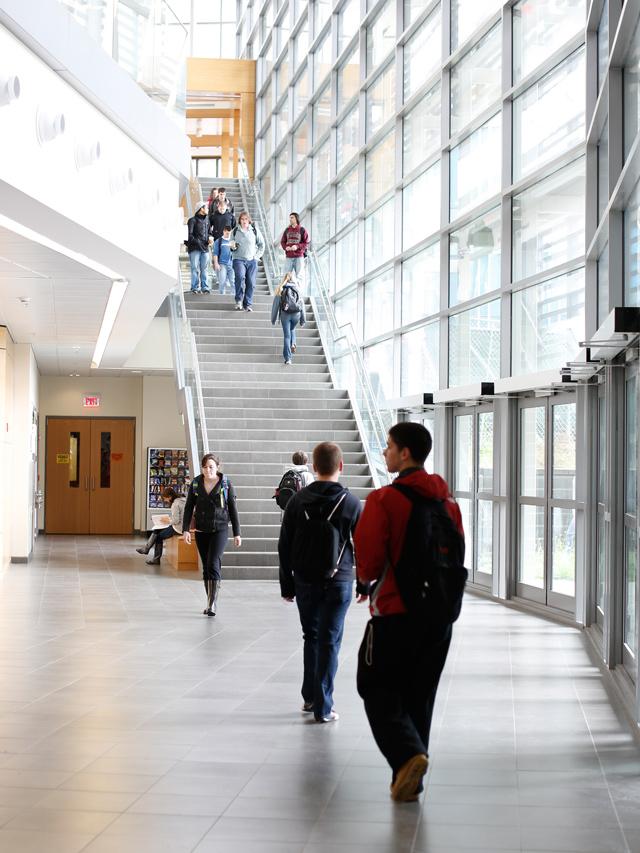OPINION: RETURNING UMASS STUDENTS TO RECEIVE DIMINISHED EXPERIENCE WHILE COSTS REMAIN UNCHANGED

UMass Integrated Sciences Building. Photo: umass.edu

With bated breath, the local community prepares for a potential influx of students at the University of Massachusetts-Amherst. The university’s decision to house students in the Fall 2020 semester at reduced capacity and with guest restrictions have led many to question the safety of this plan. Additionally, students are now in a position where they must choose whether to attend for the semester, with a reduced college experience of remote courses but unchanged tuition. While the university has an obligation to protect the student body and the community, the reopening plan has raised questions about the potential for spreading Covid-19, the extent of enforcement mechanisms, and the larger absence of student life.
The University announced that “classes will start earlier than usual, on Aug. 24, conclude Nov. 20, and students will not return to campus after Thanksgiving recess.” Most courses in the upcoming semester will be online, except for“essential labs, studios, performance, and hands-on-courses.” Additionally, in the Fall 2020 reopening plan, UMass has noted that “all undergraduate students who have reserved on-campus housing for the upcoming semester, and for whom there is space available, are invited to live on campus under strict public health behavioral restrictions.”
In one scenario, the reopening working group came to the conclusion that there would be 7,433 beds available across all campus dorms, restricting occupancy to one student in each room. There would be specific situations where a room would be double-occupied, in cases when students know one another and are comfortable with the associated risks. There would be 800 assigned beds to be set aside for student populations experiencing the following conditions: “Homelessness, foster care status, economic hardship, students with disabilities/health accommodations.” Students would only be allowed in their own dormitories, with guest restrictions and contact-tracing in place to prevent disease spread.
As an incoming graduate student in the Masters of Public Policy program, I worry about the continued cost of my education, in the context of a reduced experience and limited campus job opportunities. Lacking a stable home and safety net to return to, I am unable to take a gap semester or year, and my low-income status necessitates that I continue my education. Unlike students who have families that are able and willing to financially support them, many of my impoverished and otherwise marginalized peers must remain at the university at great financial cost in spite of heavily restricted campus activity. Additionally, some students are unable to stay home due to scholarship limitations. If they decide to stop attending for a semester or a year, they will lose their financial aid and be less able to continue their education in the future.
This decision, at the same time, limits community engagement and overall student activity. College campuses this coming year will most likely lack the traditionally advertised experience, in the context of the COVID-19 pandemic, in order to reduce student contact and promote social distancing. While this is a necessary responsibility to protect the students and the Amherst community, in doing so, the university removes what defines college for so many. This ranges from more abstract experiences, such as finding community through student organizations and exploring one’s passions in the classroom, to small aspects like enjoying late-night UMass dining with friends and attending campus parties. Despite these changes, there will be no foreseeable decrease in tuition costs. Students will be paying for an online educational experience, with disconnected classroom interaction, and restricted community activity.
Behind these restrictions lies the unfortunate reality that the University cannot enforce the rules at all times. There are limited enforcement mechanisms to control students who leave campus to attend off-campus parties, or travel outside of the local area. The “UMass Agreement” is a social contract meant to remedy this problem. By signing such a document, upon returning to campus, students can be held accountable for “reckless behavior, failure to comply, disruptive behavior, and violation of university policies and regulations.” This system is foundationally built on shared responsibility and a belief in sacrifice for collective safety, which not all students may share. While the university promotes the agreement in good faith, many students will not follow university guidelines, which creates the risk of a disease outbreak.
The University is in a precarious position as they must balance many competing and conflicting needs: the academic experience, student life, public safety, staff, faculty and professor salaries, and more. In the context of the Covid-19 pandemic, this is a unique time. No plan for the upcoming semester would have likely ever appeared as it has in prior years. However, in promoting remote instruction and restricted community engagement, the University presents a campus experience not worth the standard cost.
The systematic defunding and commodification of higher education has forced the University to open to survive, putting student lives in jeopardy without adequate enforcement mechanisms. In order to protect the community and provide an accessible college experience, the University administration and the Board of Trustees should further lobby legislators and publicly condemn the root of this issue: a state funding failure. Students should not be forced to pay nearly $30,000 each year for a restricted and remote college experience, which in some ways promotes educational inequity and the potential spread of disease.
Timothy Scalona is a 2020 graduate of UMass Amherst, where he majored in political science and journalism.
